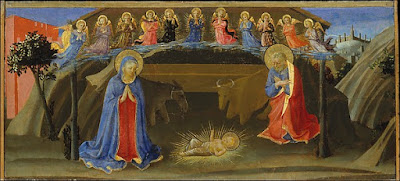After celebrating Christmas for a week or so with perhaps too much mirth, we are given the sober tale of the great meeting in Temple. The newborn Jesus is brought to be presented to the Lord, as is the long-established custom. And very soon the story of a commonplace religious ritual becomes fraught with great mystery. Two holy elders, Simeon and Anna representatives of the Old Covenant, recognize the Child as the Christ. Jesus is indeed the messenger of the New Covenant, embodying the binding up of heaven and earth, accomplished through his Incarnation. He is God with us. Old and New Law meet in a sacred encounter.
So it is that in the etching by Rembrandt, all is ordinariness and heavenly mystery at once. We see Simeon's dim eyes and reverent caress and blessing of the Child cradled in his arms, Mary and Joseph kneeling awe-struck, Anna folding her hands as she bows and notices the Child which an angel is boldly pointing out to her, and finally the little serving girl who gazes out to us and the crippled man departing to the left, both adding quiet drama to the scene.
"Now, Master, you may let your servant go
So it is that in the etching by Rembrandt, all is ordinariness and heavenly mystery at once. We see Simeon's dim eyes and reverent caress and blessing of the Child cradled in his arms, Mary and Joseph kneeling awe-struck, Anna folding her hands as she bows and notices the Child which an angel is boldly pointing out to her, and finally the little serving girl who gazes out to us and the crippled man departing to the left, both adding quiet drama to the scene.
"Now, Master, you may let your servant go
in peace, according to your word,
for my eyes have seen your salvation,
which you prepared in sight of all the peoples,
a light for revelation to the Gentiles,
and glory for your people Israel."
for my eyes have seen your salvation,
which you prepared in sight of all the peoples,
a light for revelation to the Gentiles,
and glory for your people Israel."
Rembrandt Harmenszoon van Rijn, The Presentation in the Temple with the Angel, c. 1630, etching, 4 x 3 in. Alva de Mars Megan Chapel Art Center, Saint Anselm College.































